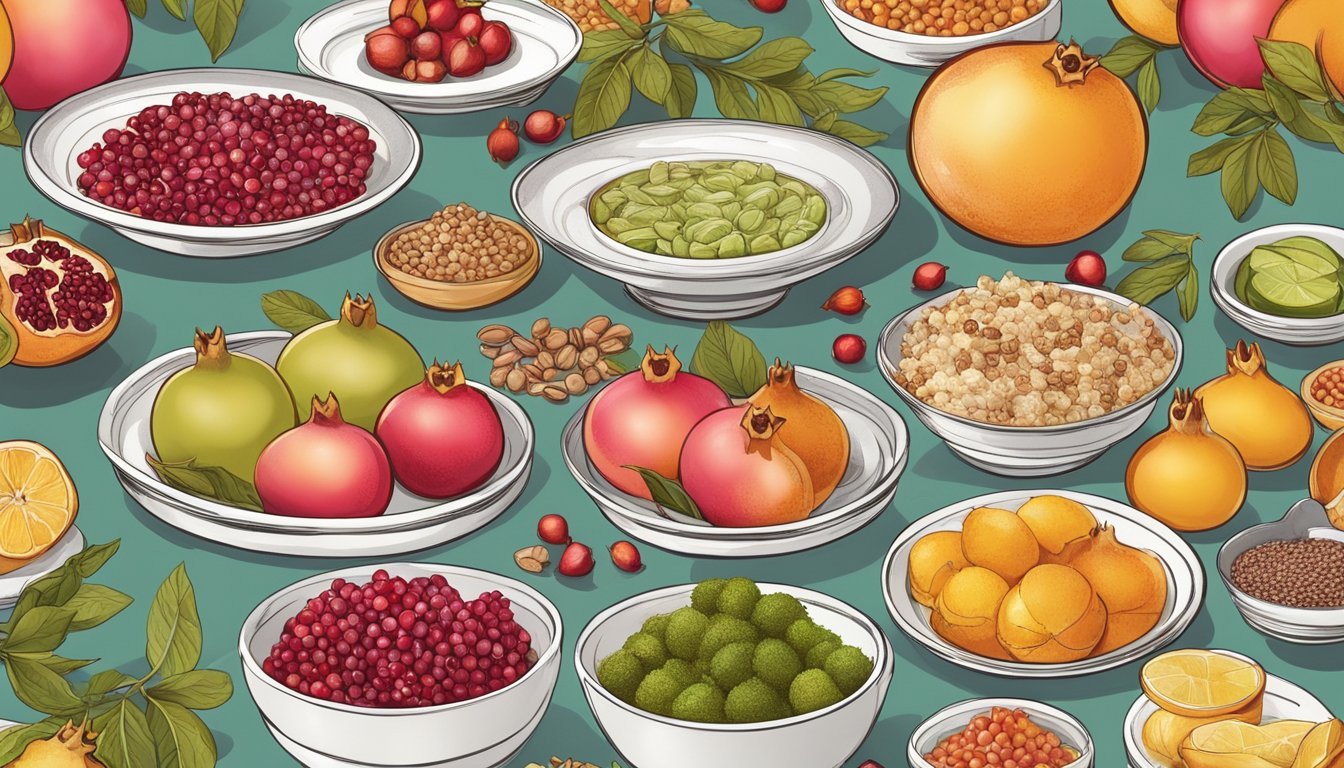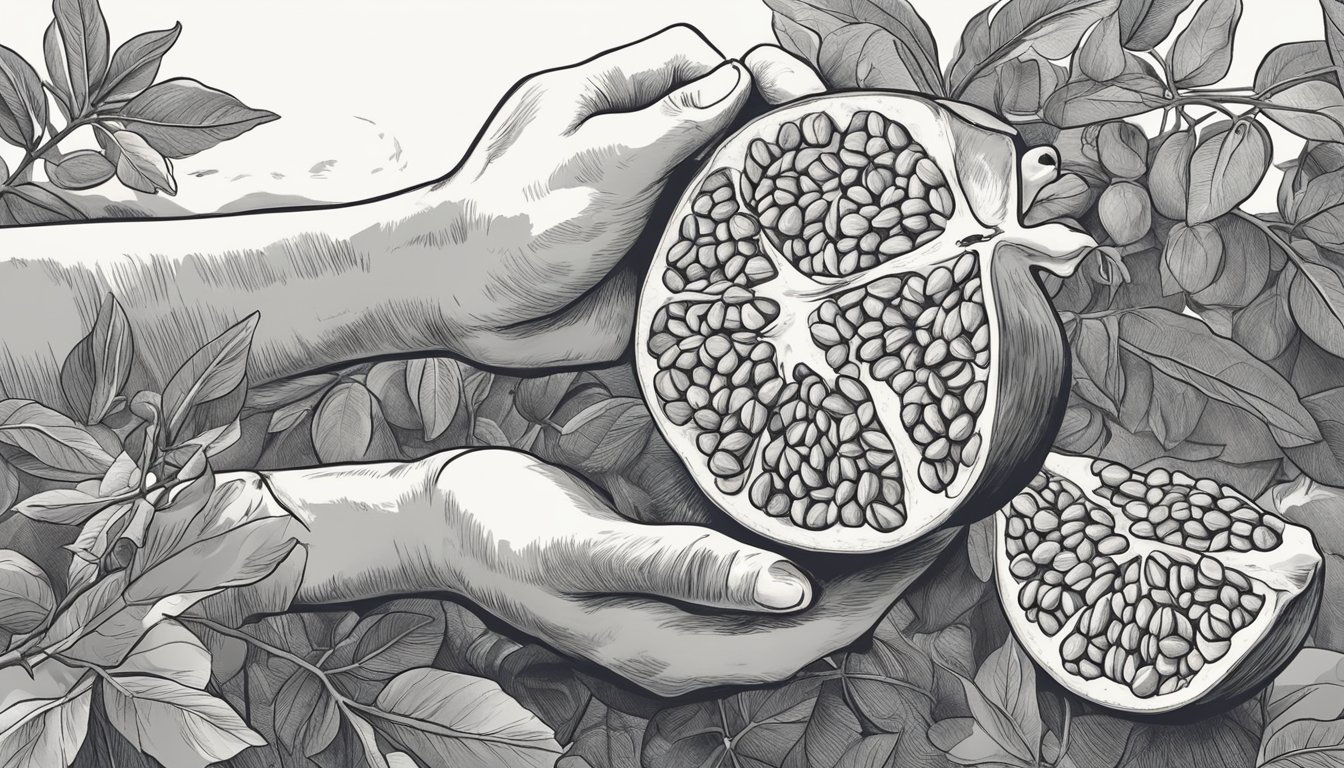Pomegranates Substitutes
Best Alternatives for Recipes
Pomegranates add a unique burst of tart and sweet flavor to dishes, but they may not always be available or suitable for everyone’s preferences. Thankfully, there are several effective substitutes that can mimic the taste and texture of pomegranate seeds. Cranberries, whether fresh or dried, are among the best alternatives, offering a similar tartness and crunch.
Blackberries, cherries, and red currants also serve as excellent substitutes, providing a comparable balance of sweet and sour elements. Each of these fruits can adapt well to various recipes, ensuring that your dish retains its desired flavor profile. For those who need a liquid substitute, pomegranate syrup or grenadine can replicate the sweetness and color of pomegranate seeds in sauces and beverages. Pomegranate molasses, a thick syrup made from reduced pomegranate juice, is also a popular option in Middle Eastern cuisine.
Selecting the right substitute depends on the specific requirements of your dish, and keep in mind that the color of the dish may be affected by the substitute you choose. Sometimes, it can be difficult to find a good substitute for pomegranate seeds; in such cases, it may be best to omit them or adjust other ingredients to maintain flavor and presentation.
For a fresh, crunchy texture, go with raspberries or strawberries, which can enhance salads and desserts and also be used as a garnish to provide color and bursts of flavor. On the other hand, pomegranate molasses or cranberry juice can bring depth to marinades and dressings. Understanding these options ensures you can seamlessly replace pomegranates without compromising on taste or texture.
Understanding Pomegranates
Pomegranates are known for their vibrant seeds and unique combination of sweet and sour flavors. These nutritious fruits are rich in antioxidants, fiber, and essential vitamins, making them a popular choice in various recipes.
Pomegranate Characteristics
Pomegranates are characterized by their round shape and thick, reddish skin. Inside, they contain hundreds of small, edible seeds called arils. These arils have a juicy texture and a bright red color, giving dishes a distinct appearance.
The taste of pomegranate seeds is a balance of sweetness and sourness. The flavor profile can vary greatly depending on the ripeness of the fruit. Some pomegranates are more tart, while others are sweeter, providing versatility in culinary applications.
Healthy Components of Pomegranates
Pomegranates are packed with health benefits due to their rich nutrient content. They are a significant source of antioxidants, which help protect the body against free radicals. These antioxidants include polyphenols and flavonoids.
In addition, pomegranates provide dietary fiber, which aids in digestion. They are also rich in vitamin C, essential for immune function, and iron, which supports blood health. Moreover, potassium in pomegranates helps maintain proper heart and muscle function.
Culinary Applications of Pomegranates
Pomegranates are versatile in the culinary world, offering unique flavors and textures to a variety of dishes. They are used both as seeds and in liquid forms like juice and syrup, especially in recipes that call for pomegranate seeds. Whether you are following a recipe for a main course, dessert, or a salad recipe, pomegranate can be used as a key ingredient or garnish to enhance flavor and presentation.
Use in Recipes
Pomegranate seeds add a burst of flavor and a crunchy texture to various recipes. In salads, they provide a sweet-tart taste that complements greens and other ingredients. They are often sprinkled over grain and vegetable dishes to add color and zest.
In desserts, pomegranate seeds pair well with dishes like yogurt, cakes, and parfaits. They are frequently used in Middle Eastern and Mediterranean cuisines, enhancing the taste and visual appeal of dishes. Pomegranate molasses also finds its place in marinades, glazes, and dressings, providing a deep, rich flavor. It can be combined with other ingredients to create a flavorful mixture for sauces or dressings.
Pomegranate Juice and Syrup
Pomegranate juice, known for its vibrant color and antioxidant properties, is a popular ingredient in beverages. It forms the base in many smoothies, cocktails, and mocktails. Its tart yet sweet flavor profile adds depth to both alcoholic and non-alcoholic drinks. When using pomegranate juice in recipes, be sure to choose pure or fresh pomegranate juice rather than sweetened juice drinks, as not all drinks are suitable substitutes and may alter the authentic flavor.
Pomegranate syrup and molasses are thicker, concentrated versions of the juice used in cooking and baking. These syrups are made by reducing and concentrating pure, fresh pomegranate juice through simmering or boiling until a thick, flavorful syrup is achieved. They can sweeten pancakes, waffles, and desserts while also serving as a unique glaze for meats. Pomegranate molasses, in particular, is cherished for its tangy and smoky notes, making it a crucial ingredient in both savory and sweet recipes.
Ideal Pomegranate Substitutes
Finding ideal substitutes for pomegranate components enhances culinary flexibility without sacrificing flavor or texture. Many substitutes, such as tamarind paste or balsamic vinegar, are sold in most markets, making them easy to buy when pomegranate products are unavailable. Local markets are a convenient place to find these substitutes. Depending on the form you need to replace, considering both fresh and dried options, as well as liquid alternatives, is crucial.
Substitutes for Fresh Whole Pomegranate Seeds
Cranberries offer a similar tartness and deep red color making them an excellent choice. Both fresh and dried cranberries work well, maintaining a balance between sweet and tart.
If fresh seeds are unavailable, using fresh juice extracted from pomegranate arils can provide a similar flavor in some recipes.
Raspberries add a juicy burst of flavor, matching the color and slight tang needed in dishes where pomegranate seeds typically feature.
Red Currants present a close match with their bright color and tartness, suitable for salads and garnishes.
Sour Cherries and strawberries can also serve as alternatives, particularly in salads or desserts. Dried options like raisins and dried barberries can add the necessary chewy texture.
Alternatives for Pomegranate Juice
Cranberry Juice stands out due to its color and tart flavor, making it a primary substitute. It’s particularly effective in beverages, sauces, and dressings. Note that some commercial cranberry juices may contain artificial sweeteners, which can affect the flavor.
Red Currant Juice offers a similar bright color and tang, providing a slightly less intense option. It works well in both savory and sweet applications.
Sour Cherry Juice or strawberry juice can replace pomegranate juice in many recipes, contributing to fruity flavors and vibrant colors. When making homemade substitutes, you can add sugar to balance tartness or boost sweetness as needed.
Lemon Juice can be used, particularly when the tartness is essential but not necessarily the red hue. Combining with a bit of honey smooths the sharpness for more balanced results.
Replacements for Pomegranate Syrup
Blackberry Syrup captures a similar deep color and can be adjusted for sweetness. It’s versatile in drinks, desserts, and savory glazes.
Pomegranate Molasses provides a tangy, sweet flavor akin to pomegranate syrup but is more concentrated. Use sparingly in salad dressings, marinades, and drizzles.
Balsamic Vinegar can replace pomegranate syrup, especially in savory dishes. Note that balsamic vinegar is naturally bitter and sour, so you may need to add a sweetener to balance the flavor. For example, adding maple syrup can help offset the acidity and bitterness, making the taste closer to pomegranate syrup.
Tamarind Paste is another substitute, offering the same consistency and almost the same flavor as pomegranate molasses. It works well in recipes where a tangy, slightly sweet note is needed.
Cranberry Syrup or red currant syrup can also substitute, thanks to their tart and slightly sweet flavors, enhancing various recipes from desserts to gourmet sauces.
To make a homemade substitute, combine 1 cup of balsamic vinegar with sweetener (such as maple syrup) and reduce until thickened to achieve the desired consistency and flavor.
Common Pomegranate Substitute Uses
Pomegranate substitutes can be seamlessly incorporated into various meals to add flavor, texture, and nutritional value. Here's how you can use these alternatives effectively.
Incorporating Substitutes in Meals
Salads: Red currants, cranberries, and cherries are excellent in salads. Their texture and tartness complement leafy greens and other veggies. Tip: sprinkle them over mixed greens for added crunch and zest.
Smoothies: Replace pomegranate seeds with raspberries or cranberries in smoothies. These substitutes blend well, giving a similar tangy flavor. Pro-tip: freeze the substitutes beforehand for a thicker consistency.
Recipes: Sour cherries and blackberries can be used in recipes calling for pomegranate seeds. Cherries add a chewy texture, while blackberries offer a sweet-tart flavor. Note: Cut larger fruits to match the size of pomegranate seeds.
Shelf Life: Dried fruits or syrups like pomegranate syrup and cranberry juice often have a longer shelf life. Advisory: Store these substitutes in a cool, dry place to maintain freshness.
Salad Ideas with Pomegranate Substitutes
Looking to add a burst of flavor and texture to your salad without fresh pomegranate seeds? There are plenty of creative ways to achieve that signature sweet-tart pop. Dried cranberries are a top substitute, offering a similar tangy sweetness and chewy bite that works beautifully in green salads or grain bowls. For a more vibrant, juicy option, toss in fresh raspberries—they bring a bright color and a gentle tartness that mimics pomegranate arils.
If you’re after a crunchy texture, try adding toasted nuts like hazelnuts or pecans alongside your fruit substitute. This combination is especially delicious in a spinach salad with strawberries, feta cheese, and a handful of toasted pecans for extra crunch. For a chickpea salad, swap in dried cranberries or cherries for pomegranate seeds, and finish with a citrus vinaigrette made with a splash of cranberry juice for a zesty kick.
Pomegranate molasses is another excellent way to infuse your salad with rich, fruity notes. Drizzle it over roasted vegetables or mix it into your dressing for a deeper, more complex flavor. If you prefer a sweeter salad, dried apricots or dates can be chopped and sprinkled in, balancing out savory ingredients with their natural sweetness.
Some salad ideas to try with pomegranate substitutes:
Spinach and strawberry salad with feta and toasted pecans, finished with a raspberry vinaigrette.
Chickpea salad with dried cranberries, cucumber, red onion, and a citrusy cranberry juice dressing.
Mixed greens with dried cherries, goat cheese, and a drizzle of pomegranate molasses for a gourmet touch.
With these substitutes, you can enjoy the flavor, color, and texture of pomegranate seeds in your favorite salads, no matter the season.
Flavor Pairings for Pomegranate Substitutes
Pomegranate substitutes open up a world of flavor possibilities in your dishes. Dried cranberries, for example, pair wonderfully with orange zest and a touch of dark chocolate, making them a great addition to both salads and desserts. If you’re using fresh raspberries as a substitute, try combining them with balsamic vinegar and creamy goat cheese for a sophisticated flavor profile that’s perfect in salads or as a topping for crostini.
Cranberry juice is a versatile ingredient that can be mixed with lime juice and a hint of ginger to create a refreshing, tangy dressing or beverage. For a savory twist, pomegranate molasses shines when paired with lemon juice and garlic—this combination makes a rich, tangy marinade or salad dressing that elevates roasted vegetables or grilled meats.
Pomegranate syrup is another substitute that brings depth to both sweet and savory dishes. Try pairing it with warming spices like cinnamon and nutmeg for a cozy dessert sauce, or drizzle it over roasted root vegetables for a sweet-tart glaze. Dried cherries also work well with almond extract and vanilla, adding a fragrant, slightly floral note to baked goods or breakfast bowls.
Experimenting with these pairings can help you find the perfect balance for your taste buds. Whether you’re looking to replicate the tart flavor of pomegranate or create something entirely new, these combinations will inspire you to get creative in the kitchen:
Dried cranberries + orange zest + dark chocolate
Fresh raspberries + balsamic vinegar + goat cheese
Cranberry juice + lime juice + ginger
Pomegranate molasses + lemon juice + garlic
Pomegranate syrup + cinnamon + nutmeg
Dried cherries + almond extract + vanilla
With these ideas, you can confidently use pomegranate substitutes to craft dishes that are bursting with flavor and excitement.
Selecting and Storing Substitutes
Choosing the right pomegranate substitutes involves considering factors like texture, flavor, and storage methods. Proper storage ensures the substitutes maintain their quality and prolongs their shelf life.
Criteria for Choosing Substitutes
When selecting substitutes for pomegranate seeds, texture and flavor are crucial. Dried cranberries provide a similar tartness and chewiness. Fresh fruits like strawberries and raspberries match the sweetness and juiciness, though they lack the crunch.
For those needing a crunchy texturediced red grapes or sour cherries work well. Pomegranate molasses or syrup offers a concentrated flavor profile, suitable for sauces and desserts.
In cases where preserving color is important, blackberries syrup can substitute effectively.
Storage and Preservation
Proper storage of substitutes is essential to maintain quality. Dried fruits like cranberries should be stored in an airtight container, away from moisture and direct sunlight. They typically contain preservatives like sulfur dioxide to extend shelf life.
Fresh fruits need refrigeration. Wrap them gently in a paper towel and place them in a ventilated container. This method preserves their freshness and extends usability.
For pomegranate molasses or syrup, keep them in a cool, dark place. Once opened, refrigerate and use within a few months to avoid spoilage.
Ensuring correct storage practices prolongs the shelf life and preserves the texture and flavor of these substitutes.
Health Considerations for Substitutes
When considering substitutes for pomegranate seeds, it is crucial to compare their nutritional profiles and health benefits. This ensures that the substitutes not only match the flavor and texture but also provide similar health advantages.
Nutritional Comparison
Antioxidants and Vitamin C:
Pomegranate seeds are rich in antioxidants, particularly polyphenols, which help combat oxidative stress and reduce cancer risk. Substitute fruits like cranberries and raspberries also offer significant antioxidants and are high in Vitamin C, boosting the immune system
Fiber:
Pomegranates are a good source of dietary fiber, aiding in digestion and maintaining healthy blood sugar levels. Alternative fruits like cherries and strawberries also contain a similar fiber content, ensuring that the replacement maintains digestive health benefits.
Potassium and Iron:
Pomegranates provide essential minerals like potassium and iron, crucial for heart health and preventing anemia. Cherries and red currants are good substitutes, offering similar potassium levels, while dried fruits like cranberries can contribute notable iron content.
Cultural and Regional Variations
Pomegranate substitutes vary significantly around the globe, influenced by local availability and culinary traditions. These alternatives are often chosen to mimic the distinct tang and texture of pomegranates.
Pomegranate Substitutes in World Cuisines
In Middle Eastern cuisine, when pomegranates are scarce, dried cranberries or red currants are often used in recipes like tabbouleh or salads. These fruits provide a similar tangy taste and a burst of color, making them suitable alternatives.
In Indian cuisine, sour cherries or tamarind may be preferred in traditional dishes such as chaat or chutneys. Tamarind closely replicates the tartness of pomegranate seeds.
In Mediterranean dishes, raspberries or strawberries can be used in salads or desserts. Their sweetness and vibrant color provide a pleasing substitute, though the texture is softer than pomegranate seeds.








